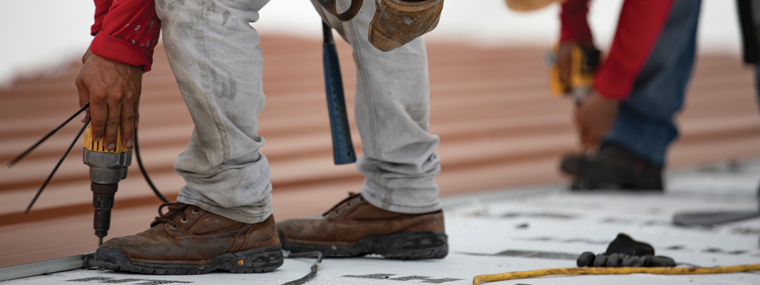
Prepare Your Roof for Hurricane Season
By Casey Crowther / Published July 2020

The 2020 Atlantic hurricane season arrived without much fanfare as Floridians focused on impacts of the global pandemic. Buried in the media headlines, however, were predictions that we’ll once again experience an above-average hurricane season. Forecasts vary, but some experts pegged the number as high as 18 named storms, with nine of those becoming hurricanes.
Those predictions aren’t meant to scare anyone, but rather to prepare Floridians for what could be a few months filled with anxiety, anticipation, and—hopefully—preparation.
In 2017 Hurricane Irma caused an estimated $50 billion in damages in the U.S., followed a year later by Hurricane Michael and its $25 billion in damages. Much of that damage is attributed to roof repairs and replacements. Hurricanes, put simply, are a roof’s worst enemy. Strong winds, heavy rains, hail, and lightning will wreak havoc on a roof that was not built well or regularly maintained.
Like many licensed commercial roofing contractors, Target Roofing & Sheet Metal was inundated with calls from property owners, property managers, and associations in need of emergency roofing repairs. While it’s difficult to defend your property from a Category 4 or 5 hurricane, many callers were unaware of the steps they should have taken in the days, weeks, and months ahead of those storms.
Below is a pre-hurricane checklist to prepare your property for hurricane season.
- Schedule an inspection: Experienced inspectors will check flashing, seams, decking, insulation, and weatherproofing, paying close attention to cracks, chips, buckles, ponding water, and missing screws or nails.
- Schedule repair work: Heed all recommendations. Property insurance claims may be rejected if it’s proven that damage was avoidable by completing recommended repairs or regular maintenance.
- Schedule a policy review: Meet with your insurance agent to review insurance policy terms, deductibles, and coverage limits. Consider purchasing property, flood, and hurricane insurance.
- • Check drainage systems: Have a professional clean the gutters, downspouts, and drains so that fallen leaves, twigs, pinecones, and even roofing debris do not impede drainage during heavy rains.
- Trim landscaping: Hire a landscaping professional to trim any branches that extend over or near a structure and to remove unhealthy trees andlimbs that will likely topple during heavy winds.
- Take photographs: “Before” photos are critical pieces of evidence in the insurance claims process to help document that a storm caused the roof damage and that it was not a preexisting issue.
- Secure all points of egress: Remember to secure rooftop hatches and doors like you would any other points of egress in a building.
- Sign up for a preventive maintenance plan: Hiring a roofer through an annual maintenance plan is a cost-effective method of extending the life of a roof and ensuring potential issues are quickly addressed before they become an emergency. Roofing contractors often prioritize existing customers after a hurricane.
The memories of hurricanes Irma and Michael may be fading, but some property owners are still locked in legal battles with insurance companies over storm damage. To this day, their roofs still aren’t fixed.
Target Roofing’s inspectors are all Haag-certified, an industry-leading credential that signifies advanced skill levels and abilities in damage and repair assessment. When Target Roofing’s inspectors visit a property after a hurricane, tropical storm, or severe weather event, they provide written inspection reports within 24 hours. These reports include photos, recommendations, and itemized estimates, essential details that can fast-track an insurance claim.
[adrotate group=”1″]
Hurricane season may have already started weeks ago, but it isn’t finished. The historical height of Florida’s hurricane season is mid-September, but some of the state’s worst hurricanes have been late-season storms, including Michael (Oct. 10, 2018) and Wilma (Oct. 24, 2005).
Once you’re in a hurricane’s forecast cone, it’s too late to be proactive. Now is the time to schedule a roof inspection and begin marking off items in the checklist above.
Casey Crowther
President, Target Roofing & Sheet Metal
Casey Crowther is a fifth-generation roofer and president of Target Roofing & Sheet Metal, a licensed and insured commercial roofing specialist headquartered in Fort Myers. For more information, please visit TargetRoofers.com or call (239) 334-7496.




